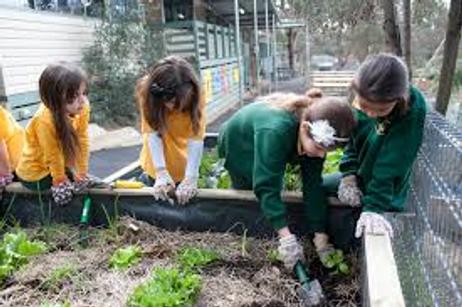Public school gardens have been sprouting across the country, especially in California, which is the home state of culinary pioneer and “slow food” spokeswoman Alice Waters. As a champion of local agriculture, Waters inspired one of the first school gardens in Berkeley, California, and many public school campuses have followed in these green footsteps.
However, a fierce debate over the merits of public school gardens has erupted following the ´ˇłŮ±ô˛ą˛ÔłŮľ±ł¦â€™s that criticizes the practice of devoting class time in public schools to the cultivation of school gardens. Flanagan argues that by allowing students to spend school hours working in a garden, we do them a grave disservice. She reminds her readers that California's public school system fails to keep one out of five high school students from dropping out prior to graduating and that the achievement gap between African-American and Latino students and their white and Asian peers persists year after year. When a state's public school system is failing to meet the academic needs of its students, it should not be spending time and resources on a luxury like a school garden, argues Flanagan.
However, Flanagan's anti-garden polemic has not been taken lightly by those who count themselves as advocates of school gardens. Flanagan's piece sparked responses from those on both sides of the debate, forcing parents and teachers to clarify their positions on this now controversial topic.
This video looks at the benefits of school gardens.
Garden Advocates
Those who identify themselves as supporters of gardens in public schools often make the following arguments to support the use of gardens as part of a public school curriculum:
Tending a garden helps students learn to make better food choices
Cultivating a garden teaches students about fruits and vegetables, helping them to become more comfortable and familiar with the world of fresh produce. This increases the chances that students will choose to incorporate healthful fruits and vegetables into their diets, rather than subsisting on candy and fast food.
Gardens can be used to explore a variety of academic subjects
Those who support public school gardens say that the practice of gardening can be used to supplement lessons in a wide variety of subjects. On the blog , Kurt Michael Freise writes, "There is nothing taught in schools that cannot be learned in a garden. Math and science to be sure, but also history, civics, logic, art, literature, music, and the birds and the bees both literally and figuratively."
Gardens teach important life skills and values
Some say that tending a garden can help to teach students lessons about teamwork, responsibility, and perseverance that might not otherwise be learned. Such character-building lessons, presumably, will later enhance students' abilities to succeed academically.
Learning to eat well is an important part of being a good citizen
Learning how to be a responsible and productive citizen in the world should involve learning how to make wise choices about which foods to eat, say the pro-gardeners. Andrew Leonard writes on that those who support public school gardens "take seriously the idea that understanding what we eat is an essential ingredient in understanding how to live well, healthily and sustainably, in this world, and that it may be just as important, or more, to the prosperous functioning of society as is the ability to play the flute, paint a picture, run the mile or use the Pythagorean theorem."
This TEDTalk explains how growing gardens will benefit growing minds/
Garden Naysayers
At the other end of the garden are naysayers, who argue that public school gardens should be cut down for the following reasons:
Teaching manual labor should not be the educational system's goal
Flanagan argues that devoting instructional hours to the care of a school garden is a waste of precious school time. She asks her readers to imagine migrant farmworkers who send their children to school in America. These workers hope that their children will have more life opportunities by attending the educational system than their parents had.
Is it not perverse, Flanagan asks, for the children of these migrant farmworkers to then find themselves hunched over a plot of dirt during the hours when they are supposed to be receiving the education that will open these new doors of opportunity to them?
No proof that gardens help students succeed academically
Flanagan notes that she has found no research or other concrete evidence to support claims that gardens are beneficial for students academically.
Takes time away from pressing academic concerns
California has been a fervent advocate of public school gardens, and a majority of public schools now have a garden of some type. However, the California public school system is widely regarded as being in deep trouble. According to Flanagan's article, nearly 60% of African-American and Latino high school students in California do not end up earning high school diplomas. With such a formidable educational crisis on our hands, argues Flanagan, we cannot afford to be spending students’ time tending to flowers.
Re-Examining Curricular Choices
A more polarizing article on the subject of school gardens has never before been written. While many may take issue with Flanagan’s argument, one can hope that it will push curriculum designers, teachers, and school administrators towards establishing stronger rationales for their curriculum, whether or not those choices involve gardens.
Questions? Contact us on Facebook @publicschoolreview











